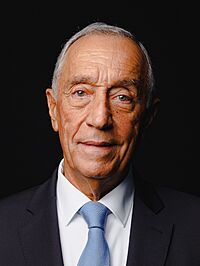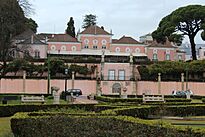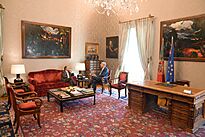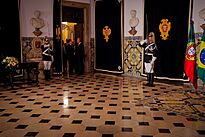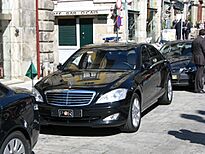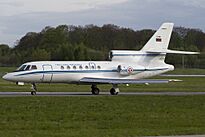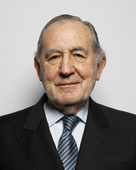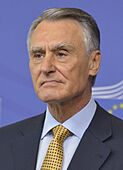President of Portugal facts for kids
Quick facts for kids President of the Portuguese Republic |
|
|---|---|

Presidential standard
|
|

Coat of arms used by the presidency
|
|
| Presidential Office of the Portuguese Republic | |
| Style |
|
| Member of |
|
| Residence | Belém Palace |
| Seat | Lisbon, Portugal |
| Appointer | Direct election |
| Term length | Five years
renewable once consecutively
|
| Constituting instrument | Constitution of Portugal (1976) |
| Precursor | President of the provisional government of the Portuguese Republic |
| Formation | 24 August 1911 |
| First holder | Manuel de Arriaga |
| Succession | Speaker, then one of its deputies per seniority |
| Salary | €137,662 annually |
The President of Portugal, officially the President of the Portuguese Republic, is the head of state and highest office of Portugal.
This important role represents Portugal and ensures the country's democratic system works smoothly. The President makes sure that Portugal's government works well and follows the rules of the Constitution.
Portugal has a special system called a semi-presidential system. This means the President has some powers, but the Prime Minister and the government also have many responsibilities. The President acts like a "moderating power," helping to balance the different parts of the government.
The current President of Portugal is Marcelo Rebelo de Sousa. He started his term on March 9, 2016.
Contents
The President of Portugal: A Key Role
Portugal's government uses a system where the President has significant duties. While the Prime Minister and the parliament manage many daily government tasks, the President has important influence. This is especially true in areas like national safety and how Portugal interacts with other countries.
The President is also the supreme commander of the Armed Forces. This means they are the top leader for all military branches. The President holds the highest office in the country, ranking above all other politicians.
In the past, before the Carnation Revolution in 1974, the President's powers changed a lot. Some presidents had almost total control, while others had very little power. During a period called the Estado Novo, the Prime Minister held most of the real power, even though the President seemed to have many powers on paper.
What Does the President Do?
The President has several key responsibilities that help keep the country running smoothly.
Appointing the Government
One of the President's biggest powers is choosing the Prime Minister. However, the Prime Minister must have the support of most members in the parliament. If the parliament doesn't trust the Prime Minister, they can remove the government.
The President can also decide to dissolve parliament. This means new elections must be held. This power is sometimes called the "atomic bomb" because it's a very strong tool. For example, President Jorge Sampaio used this power in 2004 to change the government.
Leading the Armed Forces
The President is the supreme commander of Portugal's military. This role gives the President authority over the Armed Forces. For instance, in 2003, President Sampaio limited Portugal's involvement in the Iraq War. He prevented the regular army from being sent, as he disagreed with the war. Instead, members of the National Republican Guard, a military force not part of the Armed Forces, were deployed.
Important Powers of the President
The Portuguese Constitution gives the President many important powers. These powers help the President protect the country and its laws.
- The President leads the Armed Forces and appoints their top commanders.
- The President can dissolve the parliament, which leads to new elections.
- The President appoints the Prime Minister and other government members. They can also dismiss the government if needed for democracy to work.
- The President can dissolve the governments of Portugal's autonomous regions if they act against the Constitution.
- The President declares states of siege or emergency, but only after consulting the government and getting approval from parliament.
- With government proposal and parliament's approval, the President can declare war or make peace.
- The President approves or rejects new laws. If the President rejects a law, it can be sent back to parliament for review.
- The President approves international agreements and treaties with other countries.
- The President decides if a national referendum (a public vote on an issue) should be held, if parliament proposes it.
- The President can ask the Constitutional Court to check if new laws follow the Constitution.
- The President appoints important state officials, like representatives for autonomous regions and judges.
- The President appoints ambassadors to other countries and welcomes foreign diplomats.
- The President can grant pardons or reduce sentences for people, after consulting the government.
How the President is Chosen
The President of Portugal is elected by the people for a five-year term. To be a candidate, a person must be Portuguese and at least 35 years old. A President can be re-elected, but only for two terms in a row.
The official home of the Portuguese President is the Belém Palace in Lisbon.
The Election Process
Presidential elections use a two-round system. If no candidate wins more than 50% of the votes in the first round, the top two candidates compete again. This second round happens two weeks later. So far, a second round has only been needed twice, in the 1986 and 2026 elections.
Most presidents elected since 1974 have served two terms. They are often very popular figures in the country. However, some presidents, like Aníbal Cavaco Silva and Marcelo Rebelo de Sousa, have seen their popularity decrease during their time in office.
What Happens if the President Can't Serve?
If the President dies or becomes unable to continue in office, the President of the Assembly of the Republic takes over. This temporary President has limited powers until a new election can be held. If the President of the Assembly is not available, other senior members of parliament take over in a specific order.
This is the current order of succession for the President of Portugal:
| No. | Office | Incumbent | Party | |
|---|---|---|---|---|
| – | President of the Republic | Marcelo Rebelo de Sousa | Social Democratic | |
| 1 | President of the Assembly of the Republic | José Pedro Aguiar-Branco | Social Democratic | |
| 2 | First Vice President of the Assembly | Teresa Morais | Social Democratic | |
| 3 | Second Vice President of the Assembly | Diogo Pacheco de Amorim | Chega | |
| 4 | Third Vice President of the Assembly | Marcos Perestrello | Socialist | |
| 5 | Fourth Vice President of the Assembly | Rodrigo Saraiva | Liberal | |
| 6 | Longest-serving member of the Assembly | José Cesário | Social Democratic | |
The President's Home: Belém Palace
The Belém Palace is the official home of the President of Portugal. It has been the President's residence since 1910. This beautiful palace was built in the 16th century by a diplomat. Later, in the 18th century, it became a home for the Royal Family of Portugal.
Marcelo Rebelo de Sousa, the current President, lives in this historic palace.
Recent Presidential Election (2026)
The most recent presidential election in Portugal took place in 2026. Here are the results:
| Candidate | Party | First round | Second round | |||
|---|---|---|---|---|---|---|
| Votes | % | Votes | % | |||
| António José Seguro | Socialist Party | 1,755,563 | 31.11 | 3,484,695 | 66.83 | |
| André Ventura | Chega | 1,327,021 | 23.52 | 1,729,894 | 33.17 | |
| João Cotrim de Figueiredo | Liberal Initiative | 903,057 | 16.00 | |||
| Henrique Gouveia e Melo | Independent | 695,377 | 12.32 | |||
| Luís Marques Mendes | Social Democratic Party | 637,442 | 11.30 | |||
| Catarina Martins | Left Bloc | 116,407 | 2.06 | |||
| António Filipe | Portuguese Communist Party | 92,644 | 1.64 | |||
| Manuel João Vieira | Independent | 60,927 | 1.08 | |||
| Jorge Pinto | LIVRE | 38,588 | 0.68 | |||
| André Pestana | Independent | 10,897 | 0.19 | |||
| Humberto Correia | Independent | 4,773 | 0.08 | |||
| Total | 5,642,696 | 100.00 | 5,214,589 | 100.00 | ||
| Valid votes | 5,642,696 | 97.82 | 5,214,589 | 95.05 | ||
| Invalid votes | 64,565 | 1.12 | 97,750 | 1.78 | ||
| Blank votes | 61,275 | 1.06 | 173,870 | 3.17 | ||
| Total votes | 5,768,536 | 100.00 | 5,486,209 | 100.00 | ||
| Registered voters/turnout | 11,009,803 | 52.39 | 10,966,894 | 50.03 | ||
| Source: Comissão Nacional de Eleições | ||||||
Presidential Travel
The President of Portugal uses special vehicles for official travel. These include an official car and an airplane.
A Look at Past Presidents
Portugal has had many presidents throughout its history. Here's a quick overview.
Former Presidents Still With Us
Here are some former Presidents of Portugal who are still living today.
-
António Ramalho Eanes
(1976–1986)
25 January 1935 -
Aníbal Cavaco Silva
(2006–2016)
15 July 1939
See also
 In Spanish: Presidente de Portugal para niños
In Spanish: Presidente de Portugal para niños
- Politics of Portugal
 | Selma Burke |
 | Pauline Powell Burns |
 | Frederick J. Brown |
 | Robert Blackburn |


